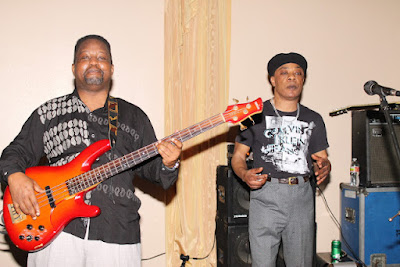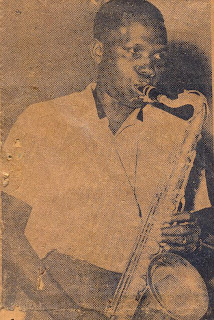Many people believe that the last month of the year tends to
be characterized by many shocking tragedies, it seems this is in someway true
in the community of Tanzanian musicians. Here are some of the tragedies that
befell some Tanzanian musicians in the month of December.
Let me go back to the night of December 12, 2010, on that
night Ramadhani Mtoro Ongala, a famous musician also known as Dr. Remmy Ongala
died. Dr Remmy died at the Regency
Hospital in Dar es Salaam Dr Remmy came to Tanzanian from Congo and he joined
the Orchestra Makassy band, a band led by Mzee Makassy whom Remmy used to
identify as his uncle. After some time, Remmy left Orchestra Makassy and joined
the Super Matimila Band that was based in Songea, a town south of Tanzania, he
again rejoined Orchestra Makassy where at that time I was lucky to be one of
the musicians in the band, and on the lineup
of that great band then there was also the great late Mosese Fan Fan. Dr Remmy again returned to
Super Matimila and was the band leader for a long time, playing a style he
called the Bongo Beat. But eventually Dr
Remmy left dance music scene and turned to gospel music until death. Dr Remmy
was buried on Thursday 16th December
2010 in the Sinza cemetery, not far from an area named after him, 'Sinza kwa
Remmy'. On the eve of Dr Remmy's burial,
various musicians gathered at Dr Remmy's house and played music throughout the
night to bid farewell to their comrade. Just two days after Dr. Remmy's
funeral, another musician who was riding a motorcycle that led the procession
to the cemetery to bury Dr. Remmy had a fatal accident, he was hit by a car and
died on the spot, he was returning home with his motorcycle after his music
gig, it was Saturday 18 December 2010. The musician was Abou Semuhando also
known asG Lokasa or Baba Diana. Abou was a veteran drummer and was at a time with Dr Remmy in the Super Matimila Band. Other
bands that Abou had played drums in,
include Sola TV Band , Vijana Jazz Band
and The Diamond Sound Group. Abou was buried at his home village in Kibanda, Muheza. To add to this sad occasion, on the day of
his death, Abou’s eldest daughter was to get married.
 |
| Group photo of the Super Matimila Band, standing from left to right - the late Dr Remmy Ongala, the late Abou Semhando, the late Kasaloo Kyanga, the late Mosese Fan Fan. |
Another December death occurred at dawn on 28 December 2011 at the Marie Stoppes Mwenge hospital in Dar es Salaam. The talented bass guitarist Andisye Swebe, better known as Andy Swebe, suffered from an asthma attack at night, he was rushed to the hospital, but Andy died. Andy learnt how to play the guitar from David Mussa the leader of Safari Trippers Band, he then played in a small band called Oshekas, but then moved to Morogoro where he was employed in a leather factory. One day Mzee Makassy's band had a gig in Morogoro and when he was invited on stage to play a bit, Mzee Makassy was so pleased with his playing that he asked him to join the band, that was the beginning of Andy's long journey in music, later he moved to Lovy Longomba's Afriso Ngoma Band, which had at that time great musicians like Kassim Mponda, Raymond Thomas, Seif Lengwe, Sololo wa Imani, John Maida, Ramadhani Kinguti, Kalamazoo and others. Later he moved to MK Group, after some times left the group and moved to Bicco Stars, the music journey continued when he and the saxophonist the late Mafumu Bilali launched their own band and called it the African Beats Band. They had problems about the name of the band, and Andy moved to the Kilimanjaro Connection band under Kanku Kelly and together they toured several countries for several years with this band. Andy was a freelance musician without a band when death took him, me and him had actually began thinking of coming up with our own band just days before his untimely death.
 |
| the late Andy Swebe on the bass guitar |
On December 15, 2014, veteran musician Shem Karenga died.
Shem Karenga died at Amana Hospital and was buried at Kisutu Cemetery. Shem had been a member of a number of bands
in his life. He started as a bass guitarist playing with the Lake Tanganyika Jazz of Kigoma, and moved to
Tabora Jazz Band where he started playing the lead guitar and composed hits
like Dada Asha. He moved to Dar es
Salaam and joined the MK Beats and
finally moved to Tabora Jazz Stars his
last band.
 |
| Left Lokassa Ya Mbongo, Shem Karenga |
Let me finish the article by remembering the musician whom
fans of the Orchestra Maquis du Zaire
band and Maquis Original
Orchestra knew by the his stage name 'Mzee Chekecha'. His official name was
Mwema Mudjanga, he was the band's trumpeter but he had a swagger that
eventually gave him the name Mzee Chekecha, he was also one of the directors of
Orchestra Maquis du Zaire Company (OMACO) and he died on December 6, 2013 in
Amana hospital and was buried in Magomeni cemetery Kagera
 |
| Mwema Mudjanga - Mzee Chekecha |
May they all rest in peace




.jpg)
.jpg)
.jpg)
.jpg)
.jpg)

















